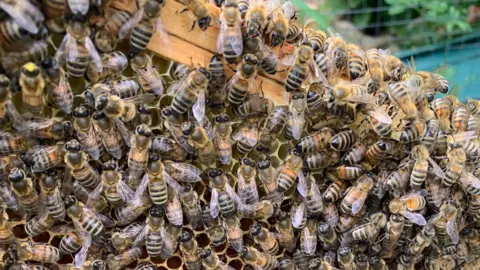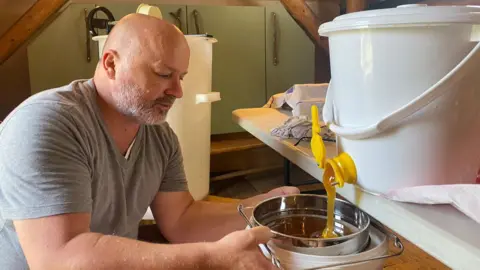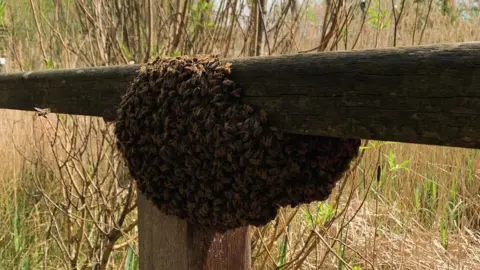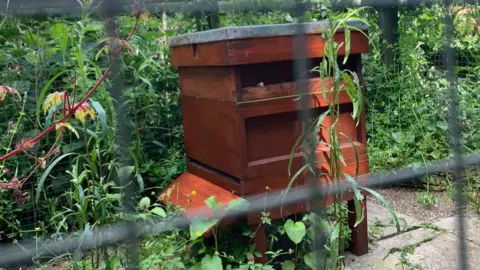Bee swarm becomes thriving colony in city farm
 Salvatore Scotti/Spitalfields City Farm
Salvatore Scotti/Spitalfields City FarmA swarm of bees found in an east London park has become a "successful" colony at Spitalfields City Farm, a beekeeper said.
Salvatore Scotti, a member of the London Beekeepers' Association, said the honeybees had done "exceptionally well" after he rescued them in April.
Mr Scotti is a volunteer swarm collector and was called by a member of the public to the swarm in Mile End Park.
They were given a home at Spitalfields City Farm after its previous colony did not survive the winter.
 Salvatore Scotti/Spitalfields City Farm
Salvatore Scotti/Spitalfields City FarmMr Scotti said the latest group had now become a "strong colony" despite the summer's wet weather.
"The colony had a virgin queen," he said.
"So the queen had to go out and meet the boys, and then she came back and she started the process of laying eggs."
Honeybees are not in danger in the UK, and are now "significantly" outnumbering native pollinators, particularly in the City of London, Pollinating London Together said.
 Salvatore Scotti
Salvatore ScottiA spokesperson for the organisation said the results from its pollinator count on 1 July showed that "wet conditions" for so much of the summer season had a "noticeable effect" on pollinator numbers.
Mr Scotti said despite this weather, the Spitalfields honeybee colony had "thrived".
"It's been a very strange season," he said. "It started very late. When you have wet weather, you don't have pollen around.
"Somehow this colony has done very well."
He added that while new colonies normally "never have enough honey to harvest the first year", this one did.
Bees rely on the honey they have created as food for the winter months, so only the excess is harvested, with a generous amount left for the colony, Mr Scotti said.
'Dominant species'
Pollinating London Together said that initial results from the 1 July count in the City of London showed that pollinator populations were "smaller than usual" this year, which it attributed to "cloudy and cool weather" on the day.
It noted a "disappointing" number of butterflies and moths counted, adding that solitary bees - which do not live in hives - were popular on the day of the count, although their numbers were "significantly down" on honeybees.
"Initial analysis suggests that honeybees remain the dominant species in the City of London," the spokesperson said.
This, they said, was largely due to beehives on roof gardens.
 Salvatore Scotti/Spitalfields City Farm
Salvatore Scotti/Spitalfields City FarmThey added that supporting one type of bee could impact the "delicate balance of nature and biodiversity".
Ms Scotti said he recognised that there were "far too many people" that kept honeybees in London.
He added that if a colony was not looked after properly, diseases could spread.
The London Beekeepers' Association states that it supports sustainable beekeeping, which it defines as a set of practices that create a "thriving and healthy ecosystem for honeybee colonies, other pollinators, the surrounding environment".
Listen to the best of BBC Radio London on Sounds and follow BBC London on Facebook, X and Instagram. Send your story ideas to [email protected]
